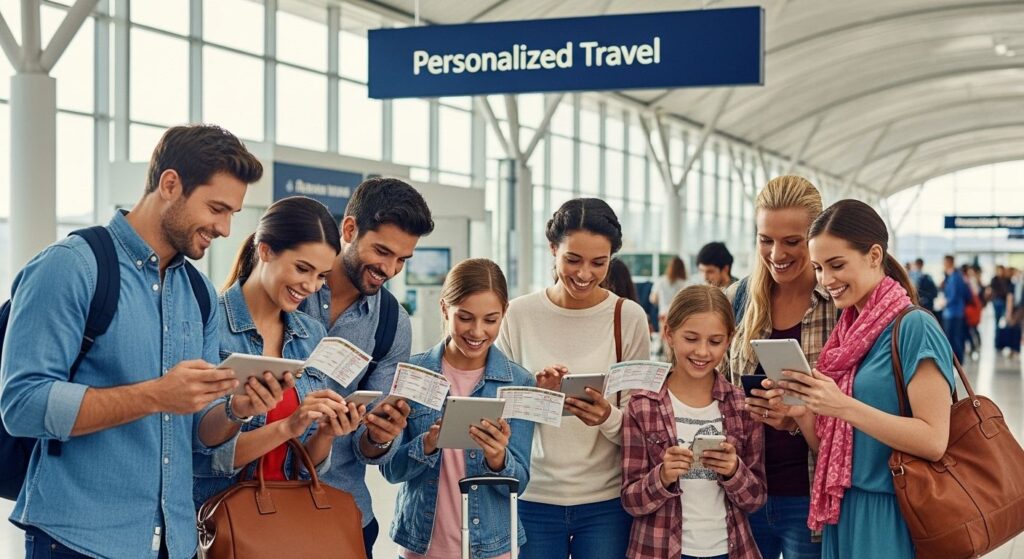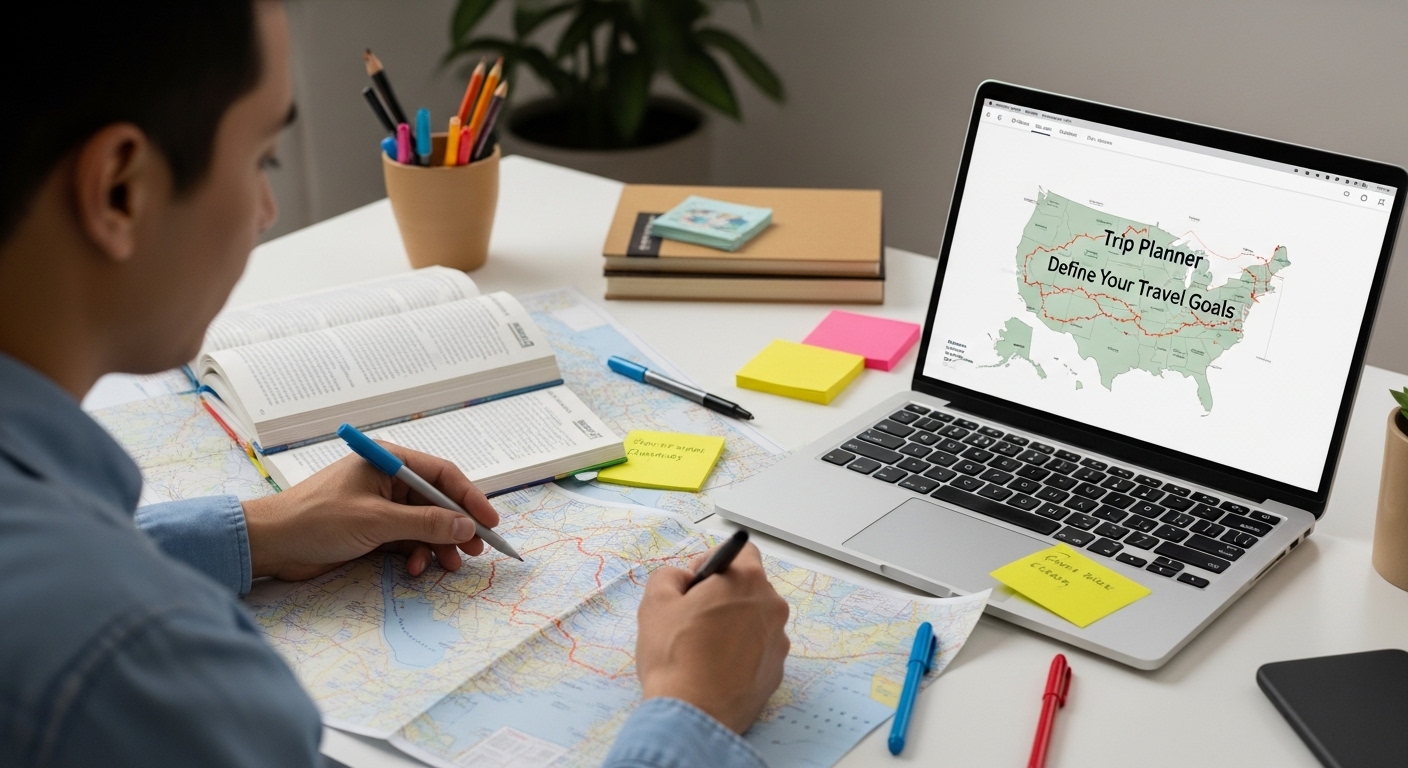Personalized travel is quickly replacing generic vacations, promising journeys that feel like they were designed just for you. Travelers now have access to trips that match their exact interests and quirks, and research shows that technology can build truly individualized travel experiences based on your habits and desires. The surprise is that this customization goes way beyond fancy recommendations or convenience. What actually happens is that your trip evolves in real time so every choice you make leads to deeper connections, richer memories, and a travel story no one else could ever replicate.
Table of Contents
- Defining Personalized Travel: The Concept Explained
- The Significance of Personalized Travel in Modern Tourism
- How Personalized Travel Works: Customization Elements
- Key Factors Influencing Personalized Travel Choices
- Real-World Examples of Personalized Travel Experiences
Quick Summary
| Takeaway | Explanation |
|---|---|
| Personalized travel tailors experiences | It creates custom trips based on individual interests and preferences rather than generic itineraries. |
| Technology enhances travel personalization | Data analysis and machine learning improve recommendations, making them more aligned with personal tastes. |
| Flexibility is key in trip planning | Adaptable itineraries allow travelers to adjust plans according to preferences and changing circumstances. |
| Authentic experiences are prioritized | Travelers seek meaningful connections with cultures rather than standard tourism packages. |
| Personalized travel increases satisfaction | Tailored recommendations lead to higher enjoyment and memorable trips for travelers. |
Defining Personalized Travel: The Concept Explained
Personalized travel represents a profound shift from traditional, one-size-fits-all vacation planning toward experiences crafted explicitly around individual preferences, interests, and unique desires. Unlike generic travel packages that offer standardized itineraries, personalized travel transforms the entire journey into a tailored adventure that resonates deeply with each traveler’s specific expectations and passions.

The Core Philosophy of Personalization
At its heart, personalized travel recognizes that every traveler is unique. Researchers from the Institute on Community Integration have highlighted how individualized travel plans can dramatically enhance personal experiences by considering individual needs, constraints, and aspirations. This approach moves beyond demographic categories and generic recommendations, instead focusing on creating truly individualized travel experiences.
Key characteristics of personalized travel include:
- Customized Itineraries: Trips designed around personal interests, not preset tour routes
- Flexible Planning: Adaptable schedules that accommodate individual preferences
- Technology-Driven Recommendations: Using data and AI to suggest experiences matching personal tastes
Technology and Personal Preferences
Modern personalized travel leverages advanced technologies to analyze individual preferences. By utilizing sophisticated algorithms and machine learning, travel platforms can now generate recommendations that feel remarkably intuitive. You might find suggestions for destinations, activities, and accommodations that align precisely with your past travel history, stated interests, and even subtle behavioral patterns.
To help you dive deeper into this concept, read our guide on personalized travel itineraries which explores how technology transforms trip planning.
The ultimate goal of personalized travel is not just to provide a vacation, but to craft an experience that feels uniquely yours. It transforms travel from a generic activity into a deeply meaningful personal journey, ensuring that every moment resonates with your individual sense of adventure and discovery.
To clarify the core differences between traditional and personalized travel, the following table compares their main features, planning processes, and traveler experiences.
| Aspect | Traditional Travel | Personalized Travel |
|---|---|---|
| Itinerary Design | Predetermined, standard for many travelers | Tailored to individual interests and preferences |
| Planning Flexibility | Fixed schedules and activities | Flexible, adaptable to changing needs |
| Use of Technology | Limited to basic booking tools | Advanced AI, data analysis, personalized apps |
| Type of Experiences | General sightseeing, group focus | Unique, meaningful, and culturally immersive |
| Traveler Satisfaction | Varies, often less memorable | Higher satisfaction and memorable journeys |
| Engagement with Local Culture | Surface-level, tourist-centric | Deep, authentic cultural connections |
The Significance of Personalized Travel in Modern Tourism
Personalized travel has emerged as a transformative force in the tourism industry, fundamentally reshaping how travelers interact with destinations, services, and experiences. This paradigm shift goes beyond mere convenience, representing a sophisticated approach to travel that prioritizes individual preferences, cultural connections, and meaningful engagement.
Technological Revolution in Travel Experience
Research from mobile internet technologies highlights how intelligent platforms are dramatically changing tourism dynamics. Modern travelers now expect experiences that are not just convenient, but deeply tailored to their unique interests. The integration of advanced data analytics and artificial intelligence enables tourism providers to create hyper-personalized recommendations that feel intuitive and authentic.
Key advantages of personalized travel include:
- Enhanced User Satisfaction: Experiences precisely matched to individual preferences
- Efficient Trip Planning: Reduced time spent on research and coordination
- More Meaningful Connections: Deeper engagement with destinations and local cultures
Economic and Cultural Implications
Personalized travel represents more than a technological trend. It signifies a profound cultural shift where travelers seek authentic, meaningful experiences rather than standardized tourism packages. By leveraging data-driven insights, our guide on interest-based trip planning explores how travelers can create more intentional and transformative journeys.
The economic implications are substantial. Tourism businesses that embrace personalization can differentiate themselves, create more targeted marketing strategies, and develop more engaging service offerings. Travelers benefit from experiences that feel uniquely crafted for their interests, leading to higher satisfaction and more memorable trips.
Ultimately, personalized travel represents a powerful convergence of technology, individual aspiration, and cultural exploration. It transforms tourism from a transactional experience into a deeply personal journey of discovery, connection, and self-understanding.
How Personalized Travel Works: Customization Elements
Personalized travel represents a sophisticated ecosystem where technology, data analysis, and human experience converge to create uniquely tailored journeys. Unlike traditional travel planning, this approach transforms trip design into a dynamic, intelligent process that adapts continuously to individual traveler profiles and preferences.
Data-Driven Personalization Mechanics
Research exploring tourism recommendation systems reveals the intricate mechanics behind personalized travel experiences. Modern platforms leverage multiple data sources to construct comprehensive traveler profiles, analyzing everything from past booking history to social media interactions, search patterns, and explicit preference declarations.
Key data points utilized in personalization include:
- Demographic Information: Age, nationality, income level
- Travel History: Previous destinations, preferred travel styles
- Online Behavior: Search queries, clicked content, booking patterns
- Personal Interests: Hobbies, cultural preferences, activity levels
Technological Customization Strategies
Advanced algorithms transform raw data into meaningful travel recommendations through sophisticated filtering and predictive modeling. Machine learning techniques enable platforms to understand nuanced preferences, creating increasingly accurate suggestions with each interaction. Learn more about how travel recommendations work to understand the intricate process behind these intelligent systems.
The personalization process involves continuous refinement. Each traveler interaction provides additional context, allowing platforms to progressively enhance recommendation accuracy.
This table summarizes the key data points and technology strategies used to create personalized travel experiences, organizing how personal information and digital tools work together.
| Data Point / Technology | Description |
|---|---|
| Demographic Information | Age, nationality, income level |
| Travel History | Previous destinations, preferred travel styles |
| Online Behavior | Search queries, clicked content, booking patterns |
| Personal Interests | Hobbies, cultural preferences, activity levels |
| Machine Learning Algorithms | Analyze patterns and predict interests |
| Real-time Recommendation | Adapt suggestions based on traveler’s current choices |
| Interactive Digital Platforms | Enable ongoing feedback and instant itinerary updates |
This means your travel suggestions become more precise and aligned with your unique interests over time, creating a truly adaptive experience.
Ultimately, personalized travel represents a symbiotic relationship between technological intelligence and human aspiration. By translating complex data into meaningful, individualized experiences, these systems transform travel from a generic activity into a deeply personal journey of discovery and connection.
Key Factors Influencing Personalized Travel Choices
Personalized travel is a nuanced landscape where multiple interconnected factors shape individual travel decisions. Understanding these elements provides insight into how travelers construct unique, meaningful experiences that go far beyond traditional tourism models.
Personal Preference Ecosystem
Research on personalization in travel reveals a complex network of factors driving individual travel choices. Travelers are no longer passive consumers but active architects of their journeys, integrating personal values, aspirations, and contextual constraints into their travel planning.
Critical factors influencing personalized travel selections include:
- Individual Motivations: Personal growth, cultural exploration, relaxation
- Psychological Drivers: Emotional connection, sense of adventure
- Practical Constraints: Budget, available time, physical capabilities
- Life Stage Considerations: Family needs, professional opportunities
Technology and Decision Dynamics
Modern travelers leverage sophisticated digital tools to transform their travel vision into reality. Intelligent platforms analyze complex personal data, translating individual preferences into tailored recommendations. Learn more about interest-based trip planning to understand how technology bridges personal desires with travel possibilities.
The decision-making process has become increasingly interactive and iterative. Travelers continuously refine their choices through real-time feedback, digital recommendations, and peer insights. This dynamic approach allows for more flexible, responsive travel planning that adapts to changing personal circumstances and emerging opportunities.
Ultimately, personalized travel represents a profound expression of individual identity. By carefully synthesizing personal preferences, technological capabilities, and contextual realities, travelers can craft experiences that are not just trips, but transformative personal narratives.
Real-World Examples of Personalized Travel Experiences
Personalized travel transforms abstract technological capabilities into tangible, memorable experiences that resonate deeply with individual travelers. These real-world applications demonstrate how sophisticated platforms can turn personal preferences into extraordinary journeys that transcend traditional tourism approaches.
Cultural Immersion and Tailored Exploration
Research exploring user-centric travel models reveals innovative approaches to creating deeply personalized travel experiences. Consider a traveler passionate about indigenous cultures who receives a recommended itinerary that includes:
- Community-Based Experiences: Direct interactions with local artisans
- Historical Narrative Tours: Guided experiences connecting personal interests with regional history
- Culinary Journeys: Cooking classes and dining experiences matching dietary preferences
- Language and Cultural Workshops: Immersive learning opportunities aligned with individual skill levels
Technology-Driven Personal Exploration
Modern personalization goes beyond generic recommendations. Advanced platforms now analyze intricate personal data to craft experiences that feel almost intuitively designed. Discover more about personalized travel recommendations to understand how technology bridges individual desires with unique travel opportunities.
For instance, a solo adventure traveler might receive a completely different trip recommendation compared to a family seeking a relaxing beach vacation. One could be presented with high-energy hiking expeditions and extreme sports opportunities, while the other receives suggestions for kid-friendly resorts with comprehensive childcare services.
Ultimately, personalized travel represents a profound shift from mass-market tourism to individually curated experiences. By leveraging data, technology, and human insight, travelers can now design journeys that are not just trips, but transformative personal narratives that reflect their unique identities, aspirations, and dreams.

Transform Your Trip into a Truly Personalized Experience with Yopki
If you are eager to escape the stress of generic travel planning and craving an experience that matches your unique interests, you are not alone. The article explores how personalized travel puts your passions and needs at the center of every journey. Yet, spending hours on research, juggling spreadsheets, and manually planning each step can quickly drain the joy from the process. Why settle for standard itineraries, rigid schedules, and missed opportunities for authentic moments?

Now is the time to put your travel dreams in your own hands. With Yopki, you can instantly generate custom itineraries, see your days organized on a smart map, and get answers from your AI Travel Concierge—all in one simple web app. Ready to experience the seamless trip planning you deserve? Visit Yopki today and discover how easy it is to create a journey as unique as you are. Start building your next adventure now and see why traveling with a personal touch matters more than ever.
Frequently Asked Questions
What is personalized travel?
Personalized travel refers to vacation planning that is tailored specifically to an individual’s preferences, interests, and desires, moving away from generic travel packages to create a unique experience for each traveler.
How does technology contribute to personalized travel?
Technology plays a crucial role by utilizing data analytics, artificial intelligence, and machine learning to analyze individual preferences and suggest tailored destinations, activities, and accommodations that match travelers’ unique tastes.
What are the benefits of personalized travel?
The benefits of personalized travel include enhanced user satisfaction, more efficient trip planning, and deeper connections with local cultures and destinations, making the travel experience more meaningful and enjoyable.
What factors influence personalized travel choices?
Factors that influence personalized travel choices include individual motivations, psychological drivers, practical constraints like budget and time, and life stage considerations such as family needs or career opportunities.



